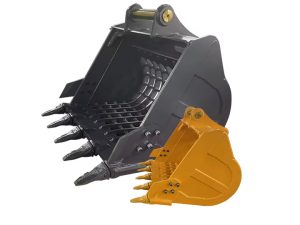
Excavators are integral machines used across various industries like construction, mining, and landscaping. The bucket is one of the most important attachments for these machines, as it plays a crucial role in digging, lifting, and material transportation. With numerous bucket options available, it’s essential to understand the different types of excavator buckets to choose the right one for your project. In this guide, we’ll explore the common types of excavator buckets, their uses, and what makes each one unique.
1. Digging Bucket
The most common type of excavator bucket, the digging bucket, is designed to scoop and move materials like soil, gravel, and sand. It comes in various sizes and typically has a straight edge or teeth, which help it penetrate tougher materials. This bucket is used for general excavation tasks, including trenching and digging foundations.
2. Seau de roche
A rock bucket is specifically designed to handle heavy, abrasive materials such as rocks, boulders, and hard dirt. These buckets are built with thicker steel and reinforced structures to endure high levels of wear and tear from rocky or harsh terrain. Rock buckets often feature a heavier build and specialized teeth for increased durability.
3. Grading Bucket
Grading buckets are ideal for leveling or smoothing surfaces. Their elongated design allows for more precise grading and fine material distribution. Commonly used in road construction and landscaping, grading buckets can handle light-duty tasks where a clean and even surface is needed, like when preparing land for paving or planting.
4. Utility Bucket
A utility bucket is a versatile option, often used for a range of applications such as light digging, backfilling, or material handling. These buckets are designed with a shallow depth, making them suitable for applications where more volume is needed but with less penetration. Utility buckets are widely used in general construction, landscaping, and smaller excavation projects.
5. Tilt Bucket
A tilt bucket offers flexibility by allowing the bucket to tilt at various angles. This feature is particularly useful for tasks that require precise grading, ditching, or sloping. With its ability to tilt up to 45 degrees in either direction, the tilt bucket is ideal for managing tasks where a controlled slope or angle is essential, such as ditch cleaning or road grading.
6. Ditch Cleaning Bucket
Similar to the tilt bucket, the ditch cleaning bucket is designed for digging, reshaping, and cleaning drainage ditches. These buckets often have longer, narrow designs to fit into tight spaces, allowing them to efficiently clean and reshape ditches or trenches. It is perfect for maintaining the integrity of water drainage systems in construction projects.
7. Mini Excavator Bucket
As mini excavators are smaller but highly versatile machines, the mini-pelle bucket is specially designed for digging in confined spaces or areas with limited access. These buckets come in various sizes and can be used for general excavation, landscaping, and trenching, especially in urban or residential projects where space is a challenge.
8. Seau squelette
The skeleton bucket is a specialized bucket designed for sorting, sifting, or separating materials. It features a series of gaps or slots in the bucket that allow fine material such as dirt or sand to sift through, while larger debris like rocks or bricks remain in the bucket. Skeleton buckets are ideal for démolition or material separation tasks.
9. Caterpillar Excavator Bucket
Caterpillar offers a wide range of excavator buckets designed for its machines. Caterpillar buckets are known for their reliability and durability, often used in heavy-duty applications like mining, earthmoving, and road construction. These buckets come in various configurations, including digging, rock, and heavy-duty options to suit different projects.
10. Clamshell Bucket
The clamshell bucket is designed for precise digging in soft or loose materials, such as sand or silt. It features two scooping halves that can open and close to grab and carry materials. Clamshell buckets are commonly used in dredging and other deep excavation projects where a high level of control is necessary.
11. V-Bucket
The V-bucket is a specialized excavator bucket with a unique V-shape, designed for digging and cutting through compacted soil and materials. Its shape allows it to break through tough materials with minimal resistance. V-buckets are often used in trenching and pipeline installation projects where precision is critical.
Conclusion
Choosing the right type of excavator bucket is crucial to the success of any project, whether it’s digging, grading, or lifting materials. The right bucket can improve efficiency, reduce wear and tear on the equipment, and help get the job done faster. Be sure to assess your project’s needs and match them with the bucket type that best suits your excavation tasks.
By understanding the different types of buckets—such as the digging, rock, grading, utility, and specialized options like the skeleton or tilt bucket—you can maximize your excavator’s potential and ensure you’re well-equipped for any challenge.
